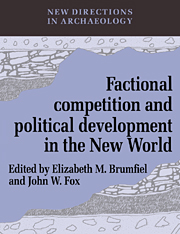Book contents
- Frontmatter
- Contents
- List of figures
- List of tables
- List of contributors
- Preface
- PART I INTRODUCTION
- PART II CHIEFDOMS
- 2 The power of prestige: competitive generosity and the emergence of rank societies in lowland Mesoamerica
- 3 Factional ascendance, dimensions of leadership, and the development of centralized authority
- 4 External warfare and the internal politics of northern South American tribes and chiefdoms
- 5 Chiefdom rivalries, control, and external contacts in lower Central America
- 6 Factional competition and the political evolution of Mississippian chiefdoms in the Southeastern United States
- PART III STATES
- PART IV DISCUSSIONS
- Bibliography
- Index
4 - External warfare and the internal politics of northern South American tribes and chiefdoms
Published online by Cambridge University Press: 18 December 2009
- Frontmatter
- Contents
- List of figures
- List of tables
- List of contributors
- Preface
- PART I INTRODUCTION
- PART II CHIEFDOMS
- 2 The power of prestige: competitive generosity and the emergence of rank societies in lowland Mesoamerica
- 3 Factional ascendance, dimensions of leadership, and the development of centralized authority
- 4 External warfare and the internal politics of northern South American tribes and chiefdoms
- 5 Chiefdom rivalries, control, and external contacts in lower Central America
- 6 Factional competition and the political evolution of Mississippian chiefdoms in the Southeastern United States
- PART III STATES
- PART IV DISCUSSIONS
- Bibliography
- Index
Summary
Warfare is often cited as an important factor in the evolution of complex societies, though usually it appears at the end of a long list of factors that contributed to the development of chiefdoms and states, with little or no attempt to examine its precise operation and its contribution to the internal politics of these societies. A notable exception is Robert Carneiro, who views warfare as a significant mechanism of political evolution, which under certain conditions of circumscription can give rise to the aggregation of autonomous villages under the permanent leadership of paramount chiefs, a critical step in political evolution (Carneiro 1981:38).
In weighing some of the factors that have been set forth to account for the development of chiefdoms and their centralized decision-making hierarchies, Carneiro attempts to distinguish between those factors that merely play a consolidating role in the emergence and legitimation of chiefdoms, and the source of the chief's political power in the first place. It is the chief's power which enables him to transcend the collective decision-making organization of uncentralized tribesmen and institutionalize a highly centralized decision-making organization with himself at the apex of a regional hierarchy of village chiefs under his control. If we are to explain the origin of chiefdoms, suggests Carneiro, we must look beyond some of the consequences of chiefly political power and seek the source of power that permits a chief to exercise centralized, hereditary leadership over his subjects (Carneiro 1981:57–8, 61, 63).
One way to seek the source of chiefly power is to assess the role that warfare can play in the development of centralized chiefly decision making.
- Type
- Chapter
- Information
- Publisher: Cambridge University PressPrint publication year: 1994
- 14
- Cited by



